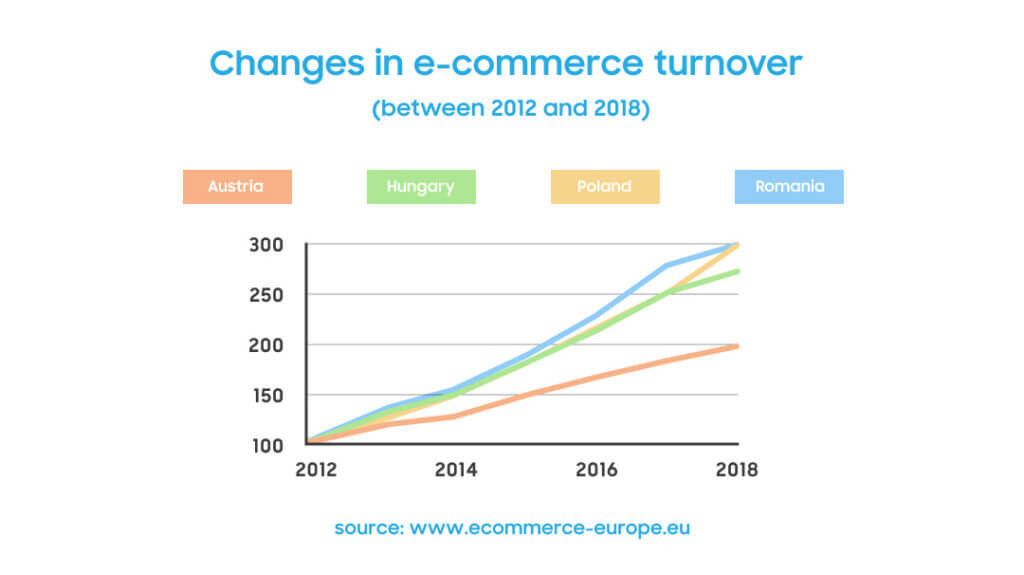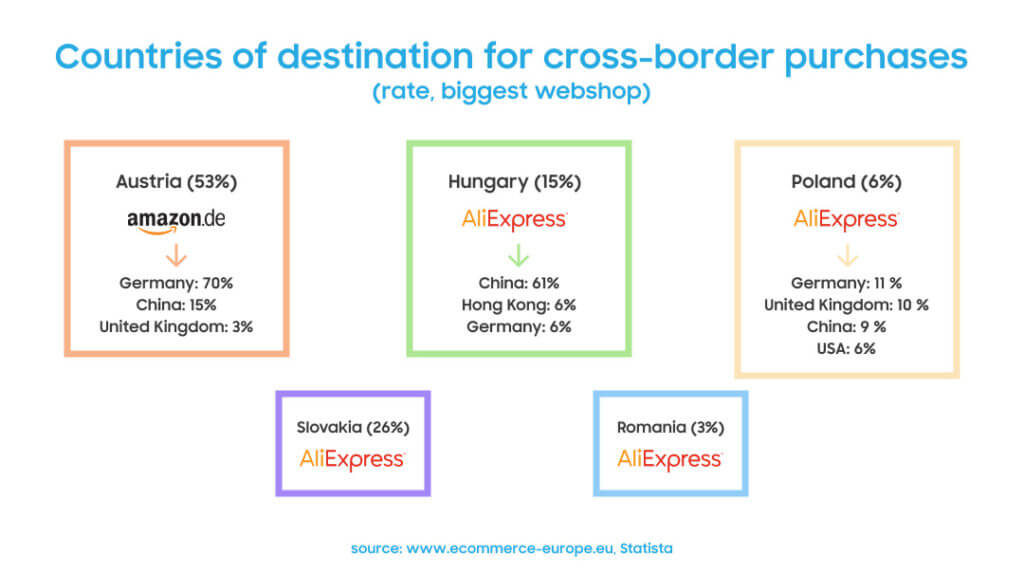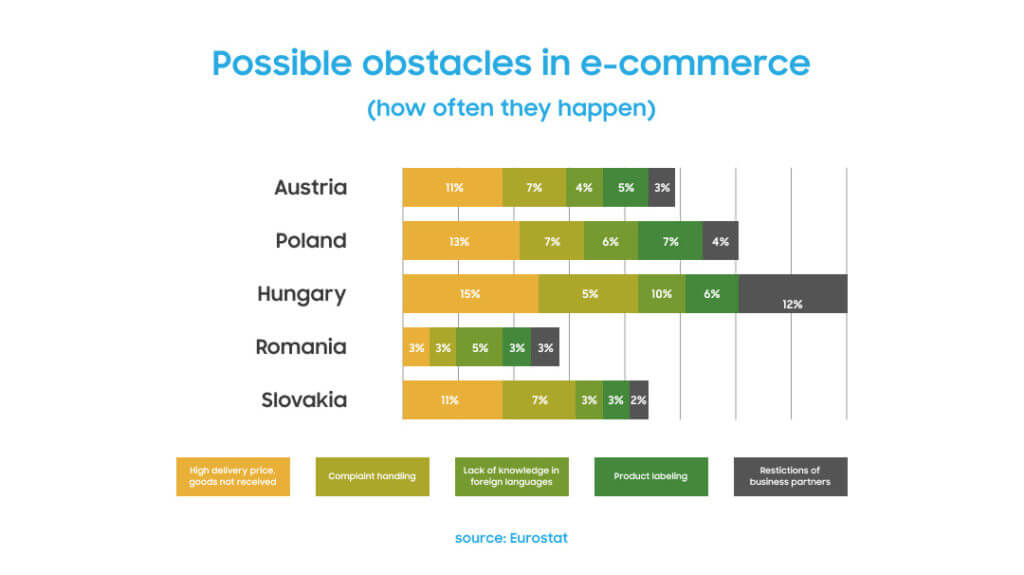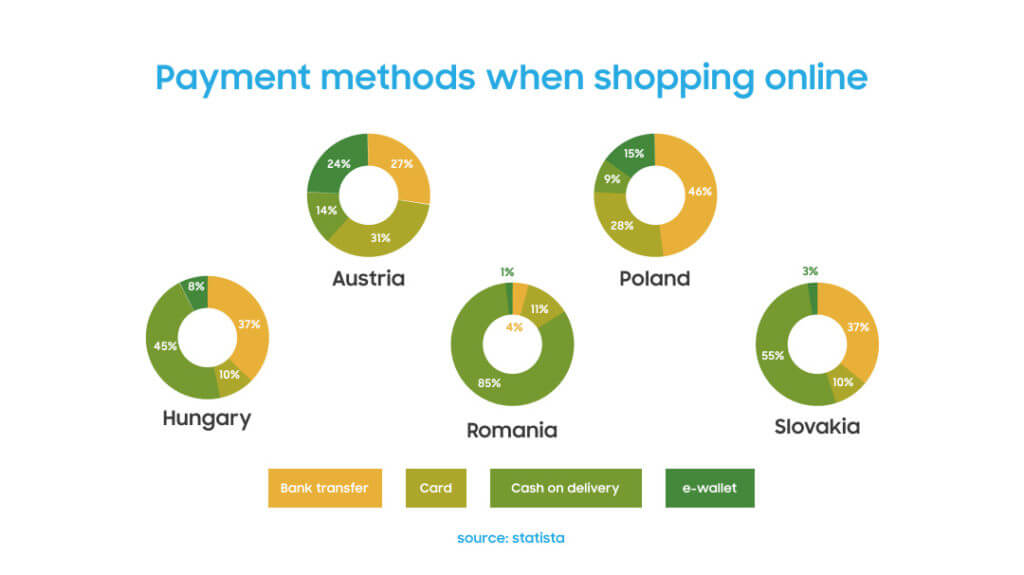There are many possible scenarios following the launch of a webshop: even fast, sudden success. If a good idea and good marketing go hand in hand and reach their target group, your business can skyrocket in the first weeks and months. However, you must know how to deal with success, just as with failure. How can we be prepared for all possible outcomes?
Let’s assume that after setting the right mission and identifying the pressure points, we’ve launched our product embedded in a logical and attractive story. Orders suddenly start pouring in. Outsourcing logistics must take place so that you can focus all your available capacity on business development. In other words, business development entails in addition to marketing, product development and seeking new ways to scale up our success. A key way of scaling up success is diversification: developing a new product or service that can be “sent” on the already paved way of success.
The other sensible option is international expansion: a popular product at home, will likely have its fair share of market abroad as well!
The e-commerce market of neighboring countries is growing at a similar rate to ours, except for Romania, which is taking giant leaps to close the enormous gap and catch up with the EU average. This growth rate is foreseeably not going to decrease in the next 2-3 years either.

We must be aware of the fact that we are free to export from Hungary to neighboring countries. The majority of Hungarian webshop owners however, immediately dismiss this option. They consider it too risky to throw their hats in the ring in a foreign environment with unfamiliar legal framework, business environment, culture and language.
Truth be told, while browsing Webshippy data, we can also see that only relatively few, around 10% of companies export abroad. We’ve been asking ourselves the question, if we are the ones shouldering the bulk of the job by dealing with logistics and providing advantageous foreign delivery prices to webshops, why don’t more companies go for this option?
This is why we’ve decided to explore what to do in terms of foreign expansion as well as ask partners already exporting about their practices.
When we are faced with a complex issue and don’t know how to tackle it, it’s always a good idea to break it down into smaller elements and move forward step-by-step. This way, it’s surely not going to seem as intimidating anymore. In the following, we’re going to look at the topics and phases launching your company on the international market involves, along with the experiences of other companies.
1. How do you know you’re ready?
Generally speaking, you can start coquetting with foreign markets once your webshop is working smoothly on the domestic market. However, this means different things to everyone. If, by any chance, you can get started on foreign markets taking relatively low risks, you ought to do it fast!
Seraph Store is a men’s clothing webshop selling “slim fit, elegant and sporty clothing” products. 40% of their sales constitute foreign sales: their main target countries are the Czech Republic, Slovakia, Romania. Recently they’ve launched their shops in the Ukraine and Bulgaria as well. In addition, they have their eyes set on the German and Austrian markets in the future. When they’ve concluded that they were doing well on the domestic market, they didn’t waste any time, as Sztanyiszlav Rizsov, their CEO says:
“With sales increasing, the moment comes when we must look for new grounds to enable the company to grow. Being opportunists, we did not even conduct thorough market research before getting started. We made a choice among neighboring countries, where we also knew the native language, and took the plunge.“
It is not always that easy to determine if the given type of product has the stability and sufficient support base for expansion. Can domestic success be exported abroad?
Nóra Juhász, co-owner of Sofa Dress agrees that a business must be stabile on domestic grounds before playing around with the idea of foreign markets. Not only for reasons of capital requirements. Prior to gaining real maturity and experience, we don’t have real basis of comparison. Adapting domestic practices can’t be automatic. Nóra draws our attention to PPC prices, for instance. They can be completely different in terms of key expressions than ones you are used to at home.
2. Localization: what to translate and how?
It is universally recognized in e-commerce circles that a generic English platform doesn’t work in foreign countries. If you’d like to reach the level of your domestic success, you can’t merely translate your content. You must create a fully “localized” online identity reflecting the local attitude and mentality.
But to what extent and with what tools? According to Sztanyiszlav, it all starts at the translation of webshops. You can begin here, but it’s even better if you have customer service available in the local language. Seraph Store basically chose their target market based on the available language skills at their company. They set foot in Slovakia because one of their colleagues is a bi-lingual colleague and could do all the translation.
Seraph Store does not have a separate webpage, instead, in Slovakia it loads the Slovakian version through the pageview function.

Sofa Dress offers premium furniture covers. They’ve just launched their shop in Romania last week and are dabbling in Austria as well, exactly because they had the necessary language skills to do so. Nora speaks German on close to native level and she happily took over the customer service-related tasks in the beginning to acquire first-hand experience on the new market. However, in terms of translation, in order to have a perfect result, they contracted professional translation services to do technical translation.
Perhaps you’ve also thought about the opportunities lying in targeting the large number of Hungarian living on the other sides of the borders. It entails crossing the border to experiment, without the cost of localization. Sofa Dress took a shot at this, but the targeting did not go so well: “We had a so-called .eu website that targeted Hungarians living in Romania and Slovakia. Despite the fact that we strictly targeted Hungarian people, Slovakian and Romanian questions kept pouring in. Therefore, we’ve ended this project. “
3. How to get clients?
When entering a foreign market, it’s a good idea to go over Hungarian marketing solutions step-by-step to see if they could work abroad. Simply translating their marketing material is a viable solution for many webshops. This obviously depends a lot on the type of product you are selling.
Sofa Dress primarily localizes domestic marketing solutions. This way they have a basis of comparison for their success, while also managing to save on the costs of the outsourcing of marketing. At the start, when there’s enormous financial pressure, this saving can be crucial.
At the same time, Nora has a clear development plan for once they’ve acquired all necessary experience: “I’ve analyzed our potential online marketing partners on the Romanian market. The company who has backed the successful launch of the Slovakian competition in five neighboring countries surely has something to offer us too. “
Yamuna sells natural cosmetics and offers professional and retail packages. Webshippy manages the logistics of the latter, dealing with the order management and delivery of primarily their exports. This mostly implies Slovakia. In the case of such a product, the localized obligatory and useful information must be displayed on the product itself. This can be quite a challenge. “There are over a thousand products in our Hungarian webshops, so we’ve entered the international market with a smaller assortment of approximately thirty products. It would have been tremendous work to translate each and every product. The main page of the product description is English, it works well for foreign markets, while the back is in Slovakian and English as well.” – says Szilvia Pánczél, founder of Yamuna.

Applying the tested and working marketing solutions abroad plays a crucial role in detecting differences in performance right at the start. This allows you to address them immediately. And market research that can prepare us for everything is non-existent. Unforeseen events always happen. It was the same for Yamuna. “Our marketing workflow consists of creating the content for our Hungarian ads, then our colleague translates it. Following this, we prepare creatives and publish it online. Currently, we are advertising on Facebook, AdWords and Instagram, this latter being surprisingly successful. The method is a bit different too from the one we use in Hungary.
Slovakian influencers work completely differently from Hungarian ones. You don’t need to pay them for each ad. We send them the product and if they like it, they often write 3-4 posts for free. They like the brand so often they’ll contact us to ask to try it. A sizeable, even 40% of our purchases come from Instagram Story. Of course, we don’t have a lot of business yet, as we are introducing an unknown-product, but the performance rates of the platform are incredible. Therefore, we invest most of our time in Instagram.
Personally, I don’t know who the Slovakian online trailblazers are, but fortunately my colleague does, to some extent. So, she knew who to ask for references. This is how we made the first list of influencers we would contact. We must have become somewhat popular by now, because the only Hungarian language Slovakian online women’s magazine contacted us to offer a barter just last week.”
Regardless, Szilvia admits that Yamuna sales have been under-performing so far on the Slovakian market. “We feel that we have not assessed the challenges of introducing a new product sufficiently. We are faced with business coming in, but not enough sales. We have personally contacted basket-abandoners: based on the feedback, it is lack of trust – and brand recognition at the root of the issue.” This is why we are working with more influencers – even organizing sweepstakes – to spark interest.
4. How do you deal with problems?
You need someone who can answer the phone, speak to customers and answer messages in the language of the target country. But how could you afford to hire a customer service representative, when you’re only on the verge of entering the new market? There are several possible solutions, nevertheless, one of the pillars of international presence is reliable customer service.
You can work with a part-time freelancer, who can help you out, in case you don’t have the good fortune of having someone at your company who speaks the language and can handle the workload. What if this person is you? Even better, since this is invaluable experience in developing your international presence.
We’ve also learnt about the methodology of Seraph Store: “With the help of our bilingual colleague dealing with translation, we’ve hired another person proficiently speaking both languages to fulfill customer service tasks. She got training on our entire Hungarian system and all she had to do was the exact same thing in Slovakian.”
Yamuna has hired additional staff with the help of reliable local workforce: “We were able to reach out to Hungarians in Slovakia through our network, and we’ve asked one of them to fulfill customer service-related tasks for us by phone and email. She works from home, has a Slovakian cell-phone number, oversees Webshippy deliveries and writes the Slovakian content. She put us in touch with the technical translator for more sophisticated texts, such as SCC or GDPR.” – adds Szilvia.
Similarly, Sofa Dress decided to keep control of their customer service when entering the Austrian market. “It was damn important in the beginning for every important question to stay with us: we’ve learnt tons from them.” – quips Nóra concerning their motivation.
They found a Hungarian living in Romania to deal with the customer service and the cooperation proven to be a very fruitful one: “communication between us is perfect, and at the same time, she is able to respond perfectly to Romanian requests.“ They found this person in group of virtual assistants. This way of working has proven to be an excellent bridging solution by getting a variety of services without creating an employment position. “This way we can avoid hiring a full-time employee, especially when we consider that we are not even able to give her enough work for a while. We start from ground zero and eventually begin to have more and more work. She is in charge of market research tasks too, as well as new translations, or ones we forgot to include in the material sent to the translation services.
5. How do you deliver packages? How do you manage returns and packages that do not get collected?
We are at ground zero as logistics services. We know exactly what we’re talking about and can tell you for a fact that if you partner up with a delivery company as a single provider, it’ll be very expensive.
And you still haven’t found a solution to deal with returns, so your customers must mail the products back to you. This is not an appealing option to them and you will surely see this risk reflected in your sales’ numbers.
We haven’t even touched on the subject of cash-on-delivery: since there is nobody who is going to physically bring back your money, if you’d like to get your cash, you will need an intermediary service and a foreign bank account.
EUROSTAT conducts continuous research on the difficulties and hurdles online businesses encounter when selling to other EU countries. The chart below shows that logistical challenges are mentioned most frequently, followed by language issues.

Yamuna entered the Slovakian market with a fulfillment service provider. Szilvia said that they had been planning international expansion for a while – they had felt that they had the necessary know-how, having a marketing professional in their team with specific experience on the Slovakian and Czech markets. The only question remaining was logistics. “We came across Webshippy while searching for a solution. We considered logistics the most serious challenge. Creating a webshop is not a biggy nowadays, but our logistics center in Kaposvár was not fit to handle foreign delivery and order management. We didn’t want to have a Slovakian headquarter because of our lack of the Slovakian language skills needed. Plus, Webshippy was offering GLS to Slovakia at a discount rate at that moment, so it was a done deal.”
There’s recent good news regarding this:
Thanks to the joint effort between Webshippy and Csomagkuldo.hu, our customers have access to the market of neighboring countries at much lower prices. This is achieved by our partners by locating the optimal logistical solution in each country and working with them at very favorable prices due to the large quantities.
We’ve managed to get to the point where we can currently send packages to collection points in Poland and Romania for 550 forints! Csomagkuldo.hu operates a headquarter in each of the countries to manage returns easily. Returns from foreign countries are taken to the local collection points and delivered straight back to our warehouse from there.
6. Market specifics: what to expect when crossing the border?
It’s a good idea to find out more about some of the cultural characteristics of the local market in advance. Obviously, we cannot cover the online consumer habits of each country in this blog. Nevertheless, during our interviews we have learnt a lot of tiny and valuable bits of information that are worth knowing about:
- Romanians prefer handling issues on phone to writing emails
- Catalogues are still very “in” for Austrians, so it can help a great deal if you manage to appear in one of them. However, this can cost you thousands of euros.
- For Slovakians, it’s important not to have Hungarian text on the packaging
- Austrians rarely use cash on delivery, whereas for Romanians it’s the most frequent payment method

7. Summary and tips from pros
To conclude with, we’ve collected some key advice given by the webshops we’ve interviewed to make you more savvy and efficient when laying the groundwork for your international expansion.
1. Hire a virtual assistant and pay them based on the amount of work completed.
You can find qualified and experienced freelancers to handle customer service, translation, copyright or other online jobs such as conducting market research and managing ads. You can work with individual contacts without all the costs of hiring an employee when your international launch is already putting a strain on your resources.
You can find the right professionals by running a search on freelancers or virtual assistants. Needless to say, it’s the most optimal solution to assign a colleague or yourself to deal with customer service tasks on the new market. It’s a great way to gain invaluable experience. However, it’s not a long-term solution. Sooner or later, you’ll have to dedicate resources to fulfilling these tasks.
2. Optimal workforce for international expansion: Hungarians across the border.
Let’s not forget the fact that Hungarians living in the target country already have hands on target market experience and they speak the living, spoken language of the country. Having a solid knowledge of both Hungarian and the foreign language, as well as cultural and business information and real experiences, they can prove to be the assistance you need for your webshop on the foreign market. It’s certainly a good idea to look for colleagues like this concerning the Romanian and Slovakian markets. There are Hungarian communities in other, neighboring countries too, though they are much smaller.
3. Outsource your logistics – if nothing else, your inventory directly heading for international markets.
Through quantity discounts we deliver the products of partner webshops way below market price.
This applies to international deliveries even more so! We offer Hungarian webshops even more attractive prices thanks to our new, international partnerships. So, it’s worth considering fulfillment and making new cost – calculations while making plans for international expansion, even if you haven’t outsourced your logistics in Hungary.
Quoting the words of Nóra Juhász :
You provide absolutely everything we could possibly need. The opportunity is right in front of your eyes, so don’t miss it!”
So, let’s go, Hungarians! We are eager to hear your newest e-commerce success stories on international markets too!

